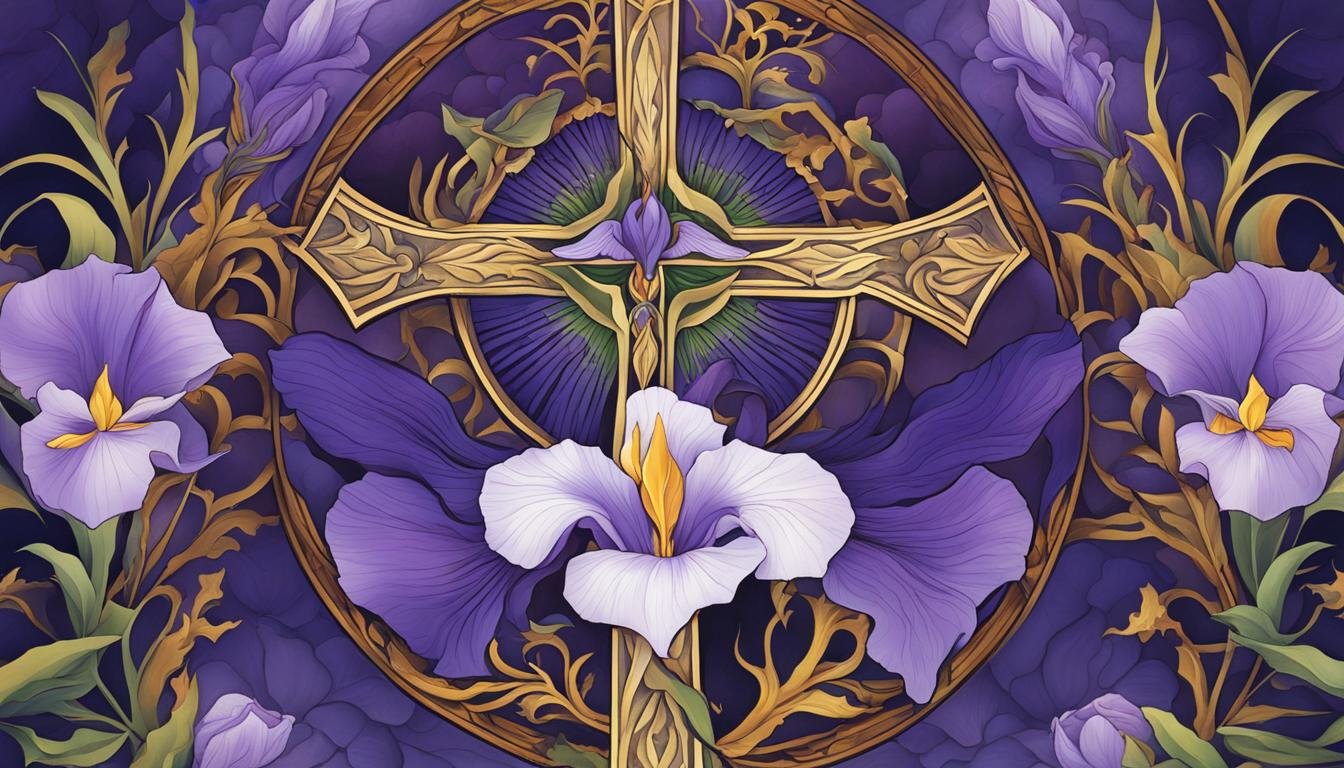The name Iris holds significant meaning in various cultures and mythologies, including its potential symbolism in the Bible. While the name Iris is not explicitly mentioned in the Bible, the iris flower carries symbolic significance and is believed to be symbolically referred to as a lily among thorns in the Song of Solomon. Additionally, in Christian art, the iris is associated with scenes of the Annunciation and represents the purity and innocence of Mary, the mother of Jesus.
Key Takeaways:
- Iris, though not explicitly mentioned in the Bible, carries symbolic significance.
- The iris flower is believed to be symbolically referred to as a lily among thorns in the Song of Solomon.
- In Christian art, the iris represents the purity and innocence of Mary, the mother of Jesus.
The Origin and Symbolism of the Name Iris

The name Iris has a rich history that traces back to its Greek origin. Derived from the Greek word for rainbow, the name Iris is closely associated with the goddess Iris, who was a messenger between heaven and earth. As the rainbow served as her pathway, the iris flower, named after her, became a symbol of communication and messages.
In addition to its Greek origin, the name Iris carries spiritual significance and symbolisms in various cultures. In ancient Egypt, the iris flower was seen as a representation of royalty and power. In Japan, it symbolized courage and strength. Furthermore, the language of flowers attributes faith, wisdom, and admiration to the iris.
“The iris flower, with its vibrant colors and delicate petals, has captivated artists and writers throughout history,” says Dr. Jane Thompson, a cultural historian. Its symbolism resonates deeply with the human desire for connection, wisdom, and spiritual growth.
The iris flower’s symbolism reflects its Greek mythology roots, where it served as a messenger connecting the divine realm with mortals. With its myriad of symbolisms, the name Iris carries a profound spiritual significance, making it a choice that encapsulates divinity, wisdom, and the power of effective communication.
| Culture | Symbolism |
|---|---|
| Ancient Egypt | Royalty and power |
| Japan | Courage and strength |
| Language of flowers | Faith, wisdom, and admiration |
The Symbolism of the Iris in Greek Mythology

In Greek mythology, the goddess Iris played a significant role as a messenger between the gods and mortals. Depicted with wings and often traveling on a rainbow, she represented the connection between the divine realm and humanity. The iris flower, named after her, held great symbolic meaning in ancient Greece.
Iris, the Messenger
The iris flower’s symbolism in Greek mythology stems from Iris’ role as the messenger of the gods. With her wings, she swiftly carried divine messages to mortals, providing a vital link between heaven and earth. The three petals of the iris were believed to represent faith, wisdom, and valor, qualities highly valued in ancient Greek society.
“The iris flower was associated with communication and messages, highlighting its significance as a symbol of communication in Greek mythology.”
Furthermore, the iris was closely connected to the goddess Hera, who protected women during childbirth and brought luck to newlyweds. The iris served as a talisman for expectant mothers, offering them the promise of a safe and successful delivery. The vibrant colors of the iris, ranging from deep blues to bright yellows, mirrored the beauty and diversity of the rainbow, enhancing its symbolism as a bridge between the mortal and immortal worlds.
The Rainbow’s Connection
As Iris traveled on the rainbow, it became a powerful symbol of the connection between the gods and mortals. The rainbow served as a pathway, bridging the gap between the heavenly and earthly realms. It represented the union of the divine with the human and the possibility of divine intervention in the mortal world.
Overall, the symbolism of the iris in Greek mythology reflects its role as a messenger and connector between the divine and mortal realms. The iris flower and the rainbow it travels on embody communication, faith, wisdom, and valor, offering insights into ancient Greek beliefs and values.
Conclusion
The name Iris encompasses a significant spiritual meaning, with connections to both the Bible and various mythologies and cultures. Although not explicitly mentioned in the Bible, the iris flower holds symbolic significance, being referred to as a lily among thorns in the Song of Solomon. It also holds a strong presence in Christian art, representing the purity and innocence of the Virgin Mary in scenes of the Annunciation.
In Greek mythology, Iris, the rainbow goddess and messenger of the gods, lends her name to the iris flower. This exquisite flower is associated with communication, messages, and acts as a bridge between heaven and earth. The three petals of the iris embody faith, wisdom, and valor, embodying virtues esteemed in ancient Greece.
With its diverse symbolism, the iris flower is revered in various cultures worldwide. From ancient Egypt, where it represented power and royalty, to Japan, where it symbolized courage and strength, the iris exudes a sense of admiration, wisdom, and faith. Naming a child Iris carries the weight of these qualities, along with the rich history and mythology surrounding this captivating flower.
FAQ
What does the name Iris mean in the Bible?
While the name Iris is not explicitly mentioned in the Bible, the iris flower is believed to be symbolically referred to as a lily among thorns in the Song of Solomon. Additionally, in Christian art, the iris is associated with scenes of the Annunciation and represents the purity and innocence of Mary, the mother of Jesus.
What is the origin and symbolism of the name Iris?
The name Iris originated from the Greek word for rainbow and is associated with the goddess Iris. The iris flower, named after her, has been used for medicinal purposes and has been a popular subject in art and literature. The iris flower has different symbolisms in various cultures – in ancient Egypt, it symbolized royalty and power, in Japan it represented courage and strength, and in the language of flowers, it signifies faith, wisdom, and admiration.
What is the symbolism of the iris in Greek mythology?
In Greek mythology, the goddess Iris was a messenger of the gods, depicted with wings, and often traveled on a rainbow. The iris flower, named after her, was associated with communication and messages. The three petals of the iris represented faith, wisdom, and valor, which were highly valued qualities in ancient Greece. The iris was also connected to the goddess Hera, protecting women during childbirth and bringing luck to newlyweds. The rainbow, on which Iris traveled, symbolized the connection between the gods and mortals, serving as a pathway between the two realms.
What is the significance of the iris in relation to the Bible and other cultures?
The name Iris holds deep spiritual significance, both in the Bible and in various cultures and mythologies. While its specific meaning in the Bible is not explicitly mentioned, the iris flower is symbolically associated with the Song of Solomon and scenes of the Annunciation in Christian art. In Greek mythology, Iris was a messenger between the gods and mortals, representing the connection between divinity and humanity. The iris flower symbolizes communication, messages, faith, wisdom, and courage. Naming a child Iris carries the spiritual and symbolic weight of these qualities and the rich history and mythology behind it.

I’m Benjamin, a passionate spiritual seeker and creator of Verses and Prayers. Alongside my girlfriend Emma and our pet lizard Mulle, I cherish family life, enjoy exploring new places, and am deeply involved in my church community. My love for reading and singing biblical verses inspires every aspect of my journey.

